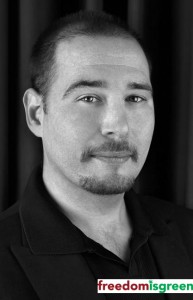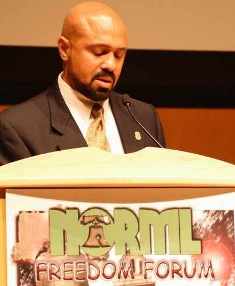5/13/2011 – Tonight in Washington DC there was a memorial for police officers killed in the line of duty. One of those keeping vigil was Neill Franklin. He worked undercover on the streets of Baltimore but now he is one of America’s leading voices calling for an end to the war on drugs as the executive director of LEAP, Law Enforcement Against Prohibition.
Franklin spent a career in Baltimore and then at the Maryland State Police Academy, so he has been to the event before, but in a different capacity. He attended the candlelight memorial service this year to honor his partner, Ed Toatley, who was shot during a cocaine buy in 2000 while on an FBI assignment.
Neill’s perspective is both moving and resolute. Still, this was the first time he attended Police Week as the director of LEAP.
We caught up with Neill for a telephone interview as he kept up a busy schedule.
Tell us about why you are attending the memorial event tonight?
Many years ago there was fund started to erect a police officer’s memorial in Washington DC. It’s similar to Viet Nam Memorial where the names are carved into stone. Every year the officers that die in the line of duty are engraved into the memorial with thousands of others. But during Police Week they they also have bike rides, torch runs – one from Philadelphia all the way down to DC Friday- and the vigil at 8:00pm.
It has been many years since I was at this event. The work I’m doing right now with LEAP kind of rung a bell for me …this October was 11 years since Ed Toatley’s assassination. I thought well this year I’m going back to DC for the vigil to celebrate and remember his life and try to make a stament this week that we can save officers lives by ending the war on drugs.
It’s not just police officers here in the US but many hundreds of officers are dying in Mexico, Venezuala, all over the world really. So it’s an international statement we’re making as well.
Chris I have to tell you that this is not a popular position to take among the law enforcement community.
So while I’m at the memorial yeah it’s probably going to be a little awkward if I’m in conversations with the other folks there; who are there to honor those who fallen. But if you look back at history there are so many things were never popular at the beginning – but it has to be done.
Have you seen some thawing on the part of active law enforcement that you have encountered when it comes to prohibition?
There has been more of that at the bottom of the ranks; at the patrol officer level, those out in the streets.
First of all they understand that this is a numbers game – to use the example of New York City; how can we miss that? Fifty thousand arrests! They know it’s a numbers game they see it’s a numbers game. This is how the federal funding comes into the coffers of local law enforcement agencies.
But if we at LEAP continue to do what we do, at least educate these officers to get the facts about the war on drugs – if they pause to let it sink in – they realize that this also makes their job much more dangerous than it needs to be.
When we talk about the Drug War many people many think of it in academic terms, but you experienced it right at the front of the conflict. It seems like police are given an awful job here to make war on their own communities?
This is what has happened. But because of our drug policies, over time, police have now become somewhat removed or physically separated themselves from their communities.
I’ve got to mention this – When I was growing up in Baltimore city the teenagers would all hang out at the end of my block. We weren’t the best kids … we did mischievous things. Some would smoke marijuana down there in the hood. But when the police car turned at the top of the hill no one scattered or yelled 5-0. But we walked over to the car and greeted Officer Rex. And if we were doing something that we shouldn’t be doing he would say ‘DON’T DO THAT! ‘and we stopped.
But he was part of the community. If something were to happen, if something were to go down and Officer Rex was to get in the middle of some real trouble, that community would be there to support and protect him. Let me ask you – Would that happen today?
Now that same neighborhood when the police car turns the corner the people scatter. If there is any communication at all there is no greeting.
This shift in relationship between police and community rests on the foundation of prohibition.
Back when was I was policing undercover I never carried a gun. We went out and worked our cases, many times without backup. That was the 1980s. Today it is unheard of to work without backup and firearm. That tells you how dangerous this job has become.
If the police were in fact a part of the community – which they should be because they often spend more time in the community they police than their homes – But if the police were just there to take a violent person out of the community they would have overwhelming support. That is how it should be.
So can these soldiers, our police, can they come around to get that community relationship back?
I believe so. It wouldn’t happen overnight. We have to begin by handling this huge wall that is put between them and their communities and it really is prohibition.
That’s why they go to search homes; for drugs. That’s why they search cars and search people, all looking for drugs. If you remove prohibition you can begin to re-build that relationship.
Because of this policy police are put in an awkward position. When you have people dying among them they shut down more and more ….they expect to deal with the worst. The policy creates the criminal market and that’s what creates the violence. Why are so many guns in our community today? Prohibition is the foundation of that too.
So there’s a real need, a necessity, to breakdown this huge barrier that has been constructed over the past 40 years.
Many of us thought we would never see the Berlin Wall come down – why can’t we do that here? Let’s end the madness of prohibition so that we can reduce the overall violence in America.
Learn more: Law Enforcement Against Prohibition http://leap.cc
[Editor’s Note – Also asked Neill about the NYC undercover encounter, look for his thoughts on that in a future post.]
Questions? [email protected]
 Chris Goldstein is a respected marijuana reform advocate. As a writer and radio broadcaster he has been covering cannabis news for over a decade. He volunteers with local groups to change prohibition laws including PhillyNORML and The Coalition for Medical Marijuana New Jersey.
Chris Goldstein is a respected marijuana reform advocate. As a writer and radio broadcaster he has been covering cannabis news for over a decade. He volunteers with local groups to change prohibition laws including PhillyNORML and The Coalition for Medical Marijuana New Jersey.
